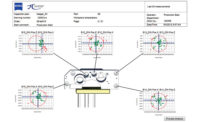WESTLAKE VILLAGE, CA-Initial quality in the automotive industry has improved significantly in 2008, with substantial gains demonstrated by nearly three-fourths of the 36 ranked manufacturers, according to the J.D. Power and Associates 2008 Initial Quality Study (IQS). The IQS serves as an indicator of new vehicle quality measured after 90 days of ownership. In 2008, overall quality improves to 118 problems per 100 vehicles (PP100), down from 125 PP100 in 2007.
Honda models captured three segment awards-more than any other manufacturer in the 2008 study-for the Civic, CR-V and Fit. Garnering two segment awards each are: Chevrolet (Malibu and Silverado LD); Dodge (Dakota and Durango); Infiniti (EX-Series and M-Series); Lexus (LS and RX); and Mercedes-Benz (CLK-Class and E-Class). The Porsche 911 has the fewest quality problems in the industry, with just 67 problems per 100 vehicles. Also receiving segment awards are the Ford E-Series, Lincoln Navigator, Mazda MX-5 Miata, Pontiac Grand Prix sedan and Toyota Sequoia.
“Due to some strong new-vehicle launches, in addition to a continued reduction in the level of defects and malfunctions, overall quality has improved by 6% in 2008, compared with 2007,” says David Sargent, vice president of automotive research at J.D. Power and Associates. “This gain is driven not only by strong advances from many of the high-volume brands such as Chevrolet, Ford and Toyota, but also by very significant improvements by many other automakers. This industry-wide improvement is a testament to the effort that automakers are putting into listening to the voice of the customer, and the hard work they have undertaken to integrate that feedback to design, engineer and manufacture better-quality vehicles. From working closely with the industry, we see the importance that is placed on initial quality. Vehicle manufacturers and consumers alike are reaping the rewards of this effort.”
The study finds that 86% of the overall improvement is due to advances in eliminating defects and malfunctions. Minimizing design problems remains a major challenge for the industry, particularly because new technology, such as navigation and entertainment devices, is becoming increasingly common in today’s new vehicles.
“As consumer demand for new and more advanced wireless communication, navigation and audio technology continues to grow, manufacturers face challenges related to how well these systems are integrated into their vehicles,” says Sargent. “In particular, issues with difficult-to-use audio and entertainment controls and voice-command recognition failure are among the top 10 problems most frequently reported by customers. Because hands-free communication for drivers will become a mandate in more and more areas throughout the U.S., this will need to be an area of continued focus for automakers.”
For a third consecutive year, Porsche tops the overall manufacturer rankings, averaging 87 PP100. Following in the rankings are Infiniti (which improves from 9th rank position in 2007), Lexus, Mercedes-Benz and Toyota, respectively. Audi posts the largest improvement in ranking, moving from 26th place in 2007 to 10th in 2008.
Get our new eMagazine delivered to your inbox every month.
Stay in the know with Quality’s comprehensive coverage of the manufacturing and metrology industries.
SIGN UP TODAY!Copyright ©2024. All Rights Reserved BNP Media.
Design, CMS, Hosting & Web Development :: ePublishing


